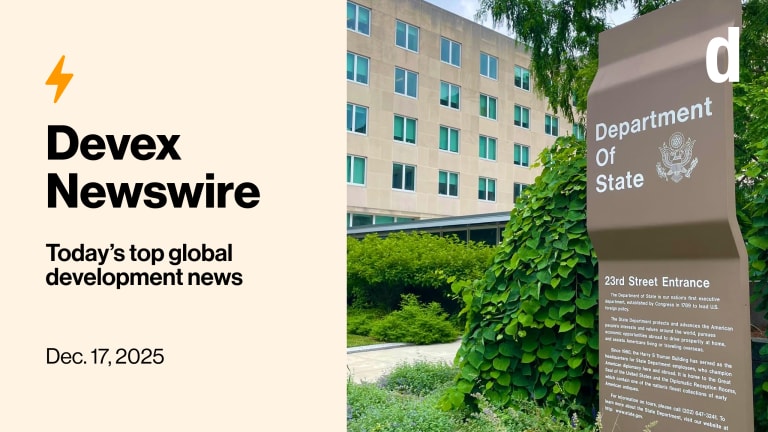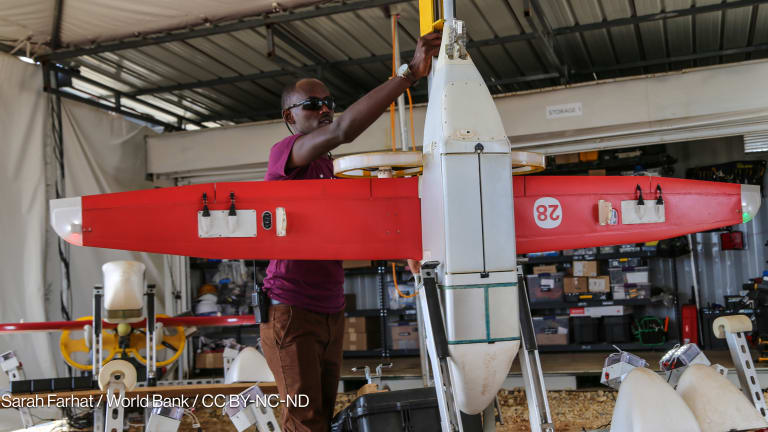Presented by The Mastercard Center for Inclusive Growth

The U.S. State Department has officially absorbed what’s left of USAID as of this week. But will the union be a happy one or a rocky one?
Also in today’s edition: Joy or frustration at the Financing for Development conference? We found out it depends on who you ask.
Upcoming event: Join us on Monday, July 7, for a Devex Pro Funding briefing on the grantmaking priorities of the Segal Family Foundation. Patricia Malila Pinheiro, the foundation’s director of programs, will talk about how the trust-based, grantee-centric funder identifies and supports changemakers, and what business development professionals should know to engage. Save your spot now.
Till death do us part?
An impending trainwreck. That’s how some panelists at our most recent Devex Pro briefing described the merger of what’s left of USAID into the State Department, which became official July 1.
“Today is a very, very sad day, a tragic day, I believe, for the United States of America,” said Susan Reichle, former USAID counselor, citing the loss of 63 years of development power and the State Department’s lack of readiness to absorb it. “They are only going to have 718 people, less than 6% of the USAID workforce, to manage these programs.”
Echoing that sentiment, James Kunder, former USAID acting deputy administrator, estimated the cost of the extra workload on a hollowed-out workforce: “One of the calculations I’m looking at right now is the per-capita management responsibility per officer at the State Department is going to go from $1.7 million to $12.8 million,” he said.
As my colleague Michael Igoe writes, panelists agreed the current struggle is about more than just bureaucratic differences — but rather the open question of whether the U.S. government still believes long-term development is in the U.S. national interest.
“Does development still serve as a co-equal instrument of our global leadership?” asked Ben Feit, a longtime implementer. “That’s fundamentally, for me, the biggest strategic question.”
That’s not the only question flying around. The State Department itself is facing imminent staff reductions and drastic budget cuts. Those will further complicate the agency’s rushed reorganization, which critics said seems devoid of strategic direction.
“How do you deliver results? What do you want to accomplish?” asked Jim Richardson, former director of the State Department’s Office of Foreign Assistance. “Do you really want to challenge China in Africa? Great. How does this new organization do that? I don't know.”
Read: State Dept takeover of USAID is an 'impending trainwreck,' experts say (Pro)
+ Looking for a deeper dive into the major issues facing global development with unrivaled analysis of the funding landscape, timely roundtables and exclusive briefings with sector leaders and policymakers, as well as tailored and insightful career resources and insider tidbits? Get these and more when you sign up for a Devex Pro membership. We offer a 15-day free trial.
Plea for transparency
While the State Department isn’t likely to go the way of USAID and completely disappear, it’s getting a taste of the massive staff and budget cuts that the former agency had to swallow.
The State Department’s reorganization proposal includes large-scale personnel cuts, or a “reduction in force” in government-speak. Those RIFs are currently caught up in legal disputes, but in the meantime, Senate Democrats are doing what they can to stop them.
Sen. Jeanne Shaheen of New Hampshire, ranking member of the Senate Foreign Relations Committee, along with her Democratic colleagues introduced legislation designed to protect the U.S. diplomatic workforce from “unjustified” reductions in force at the State Department, USAID, and other foreign affairs agencies.
Among other things, the Protecting America’s Diplomatic Workforce Act would:
• Require a justification for any significant termination of personnel and an assessment of the impact such terminations will have on the U.S. ability to compete with adversaries.
• Protect foreign service officers by ensuring that RIF decisions are primarily based on performance and prior selection board rankings.
• Prevent sudden changes to personnel policies by requiring the State Department to provide at least 30 days’ notice to Congress.
“The Trump Administration is systematically dismantling our diplomatic institutions and weakening the workforce we depend on to advance U.S. interests, respond to crises and out-compete adversaries,” Shaheen said in a statement. “At a time of growing instability around the world, from Ukraine to the Middle East, undermining our national security capabilities put Americans at risk and weakens our diplomatic hand.”
Champagne in Spain, though some complain in vain
It’s something you don’t see very often at large international talkfests that try to resolve some of the world’s toughest — and costliest — problems: happiness.
But my colleagues Jesse Chase-Lubitz and Elissa Miolene detected inklings of joy in their conversations with people at the Fourth International Conference on Financing for Development, or FfD4. “I came into this very pessimistic, and am pleasantly surprised,” one attendee said.
Praise indeed considering the weighty topics being discussed, from domestic taxation to private sector investment to debt distress.
On the latter, while the gathering in Sevilla, Spain, did not make headway on the fundamental issue of debt relief for struggling nations, it made progress in establishing a borrowers’ club meant to serve as a platform for borrowing countries to discuss technical issues, share information, and elevate their experiences.
“This is an extremely important outcome of the Compromiso de Sevilla, one we must celebrate and pursue,” said Rebeca Grynspan, secretary-general of U.N. Trade and Development, in a press briefing.
Not everyone’s press briefing went as smoothly. Civil society organizations tried to hold their own briefing but security kept bouncing them from one room to another, and at one point, wouldn’t let the press in (kudos to Jesse and Elissa for their determination to get inside).
The incident seemed emblematic of the not-so-warm welcome CSOs said they have received, with many accusing organizers of muzzling their grievances that the outcome document is watered-down and lacks ambition.
“We are told there’s no money to fight poverty or climate change — but there is,” said Tove Maria Ryding of Eurodad. “The problem is economic injustice. And the outcome of this conference reflects business as usual.”
Read: Sevilla reporter’s notebook Day 3 — hitting a stride or hitting a wall?
Taxin’ and relaxin’
Amitabh Behar, executive director of Oxfam International, agreed that development is not about money. The money is actually there — in spades. It’s about political will.
He cited an Oxfam study showing that the wealth of the world’s richest 1% has surged $33.9 trillion since 2015, enough to end annual poverty 22 times over, yet billionaires only pay around 0.3% in real taxes.
“I think this is really startling,” Behar said during an interview at Casa Devex on the sidelines of FfD4.
Behar said this $33.9 trillion is “sitting in the pockets” of the superrich — waiting to be taxed.
“And therefore, let's not constantly keep saying, ‘Where are the resources for investing in education, in health?’ It’s really about the political choices that governments make,” he said, though he expressed optimism that a growing number of governments are coalescing around the issue. “It’s going to be a tough time, but I’m absolutely sure that we are going to look at an equal future.”
Read: Poverty is a question of political will, not resources, says Oxfam head
National treasury
It’s not just about international taxation — mobilizing domestic taxes is going to be “the linchpin of development finance,” said Giulia Mascagni, executive director of the International Centre for Tax and Development, during an interview at Casa Devex.
Taxation is about more than just generating revenue. Mascagni emphasized that strong domestic tax systems are vital for securing favorable borrowing terms, attracting private sector investment, and strengthening the social contract between governments and citizens.
“At the national level, any action on development is really largely … funded by governments from their own public revenue. So that is already happening,” she said.
Still, Mascagni admitted it’s not easy for low-income countries to demand citizens pay more in taxes if people don’t see improvements in public services, especially when much of the revenue is being used to pay off debt or fill gaps left by declining aid.
But even small steps can lead to larger gains down the road.
“History shows us that really a half percentage point increase in the tax-to-GDP ratio per year is already incredibly ambitious,” she said.
Read: Why ‘tax is the only exit strategy from aid in the long term’
In other news
American contractors guarding U.S. and Israel-backed Gaza Humanitarian Foundation aid sites have, according to internal sources and videos reviewed by The Associated Press, used live ammunition, stun grenades, and pepper spray against Palestinians seeking food during relief distributions. [Politico]
The U.K. has been called out for its “hypocrisy” at the fourth Financing for Development conference in Sevilla for making significant aid budget cuts while vocally promoting its role in supporting lower‑income countries. [The Independent]
Sign up to Newswire for an inside look at the biggest stories in global development.








